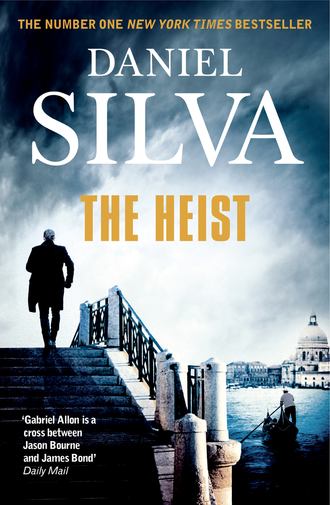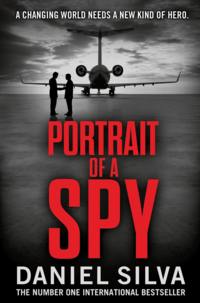
Полная версия
The Heist
“They broke his neck. It looked like a complete transection of the spinal cord.”
The general grimaced. “Silent and bloodless.”
“And very professional.”
“What did you do with the poor devil?”
“He’ll be taken care of,” said Gabriel quietly.
“By whom?”
“It’s better if you don’t know the details.”
The general shook his head slowly. He was now a party to a felony. It wasn’t the first time.
“Let us hope,” he said after a moment, “that the French police never discover that you were in Morel’s apartment. Given your track record, they might get the wrong impression.”
“Yes,” said Gabriel morosely. “Let us hope.”
They turned into the Via Roma. It reverberated with the buzz of a hundred motor scooters. Gabriel, when he spoke again, had to raise his voice to be heard.
“Who had it last?” he asked.
“The Caravaggio?”
Gabriel nodded.
“Even I’m not sure,” the general admitted. “Every time we arrest a mafioso, no matter how insignificant, he offers us information on the whereabouts of the Nativity in exchange for a reduced prison sentence. We call it the Caravaggio card. Needless to say, we’ve wasted countless man-hours chasing down false leads.”
“I thought you came close to finding it a couple of years ago.”
“So did I, but it slipped through my fingers. I was beginning to think that I would never get another opportunity to recover it.” He smiled in spite of himself. “And now this.”
“If the painting’s been sold, it’s probably no longer in Italy.”
“I concur. But in my experience,” the general added, “the best time to find a stolen painting is immediately after it’s changed hands. We have to move quickly, though. Otherwise, we might have to wait another forty-five years.”
“We?”
The general stopped walking but said nothing.
“My involvement in this affair,” said Gabriel over the drone of the traffic, “is now officially over.”
“You promised to find out who killed Jack Bradshaw in exchange for keeping your friend’s name out of the newspapers. The way I see it, you haven’t completed your commission.”
“I’ve given you an important lead, not to mention three stolen paintings.”
“But not the painting I want.” The general removed his sunglasses and fixed Gabriel with his monocular stare. “Your involvement in this case isn’t over, Allon. In fact, it’s just beginning.”

They walked to a small bar overlooking the marina. It was empty except for two young men who were grousing about the sad state of the economy. It was a common sight in Italy these days. There were no jobs, no prospects, no future—only the beautiful reminders of the past that the general and his team at the Art Squad were sworn to protect. He ordered a coffee and a sandwich and led Gabriel to a table outside in the cold sunlight.
“Frankly,” he said when they were alone again, “I don’t know how you can even think about walking away from the case now. It would be like leaving a painting unfinished.”
“My unfinished painting is in Venice,” replied Gabriel, “along with my pregnant wife.”
“Your Veronese is safe. And so is your wife.”
Gabriel looked at an overflowing rubbish bin at the edge of the marina and shook his head. The ancient Romans had invented central heating, but somewhere along the line their descendants had forgotten how to take out the trash.
“It could take months to find that painting,” he said.
“We don’t have months. I’d say we have a few weeks at most.”
“Then I suppose you and your men better get moving.”
The general shook his head slowly. “We’re good at tapping phones and making deals with mafioso scum. But we don’t do undercover operations well, especially outside Italy. I need someone to toss some bait into the waters of the stolen art market and to see if we can tempt Mr. Big into making another acquisition. He’s out there somewhere. You just have to find something to interest him.”
“One doesn’t find multimillion-dollar masterpieces. One steals them.”
“In spectacular fashion,” added the general. “Which means it shouldn’t be something from a home or a private gallery.”
“Do you realize what you’re saying?”
“Yes, I do.” The general gave a conspiratorial smile. “Most undercover operations involve sending a fake buyer into the field. But yours will be different. You’ll be posing as a thief with a hot piece of canvas to sell. The painting has to be real.”
“Why don’t you let me borrow something lovely from the Galleria Borghese?”
“The museum will never go for it. Besides,” the general added, “the painting can’t come from Italy. Otherwise, the person who has the Caravaggio might suspect my involvement.”
“You’ll never be able to prosecute anyone after something like this.”
“Prosecution is definitely second on my list of priorities. I want that Caravaggio back.”
The general lapsed into silence. Gabriel had to admit he was intrigued by the idea. “There’s no way I can front the operation,” he said after a moment. “My face is too well known.”
“Then I suppose you’ll have to find a good actor to play the role. And if I were you, I’d hire some muscle, too. The underworld can be a dangerous place.”
“You don’t say.”
The general made no reply.
“Muscle doesn’t come cheap,” Gabriel said. “And neither do competent thieves.”
“Can you borrow some from your service?”
“Muscle or thieves?”
“Both.”
“Not a chance.”
“How much money do you need?”
Gabriel made a show of thought. “Two million, bare minimum.”
“I might have a million in the coffee can under my desk.”
“I’ll take it.”
“Actually,” said the general, smiling, “the money’s in an attaché case in the trunk of my car. I also have a copy of the Caravaggio case file. It will give you something to read while you’re waiting for Mr. Big to put his oar into the water.”
“What if he doesn’t bite?”
“I suppose you’ll have to steal something else.” The general shrugged. “That’s the wonderful thing about stealing masterpieces. It’s really not all that difficult.”

The money, as promised, was in the trunk of the general’s official sedan—a million euros in very used bills, the source of which he refused to specify. Gabriel placed the attaché case on the passenger seat of his own car and drove away without another word. By the time he reached the fringes of San Remo, he had completed the first preparatory sketches of his operation to recover the lost Caravaggio. He had funding and access to the world’s most successful art thief. All he needed now was someone to take a stolen painting to market. An amateur wouldn’t do. He needed an experienced operative who had been trained in the black arts of deception. Someone who was comfortable in the presence of criminals. Someone who could take care of himself if things got rough. Gabriel knew of just such a man across the water, on the island of Corsica. He was a bit like Maurice Durand, an old adversary who was now an accomplice, but there the similarities ended.
14
CORSICA
IT WAS APPROACHING MIDNIGHT WHEN the ferry drew into the port of Calvi, hardly the time to be making a social call in Corsica, so Gabriel checked into a hotel near the terminal and slept. In the morning he had breakfast at a small café along the waterfront; then he climbed into his car and set out along the rugged western coastline. For a time the rain persisted, but gradually the clouds thinned and the sea turned from granite to turquoise. Gabriel stopped in the town of Porto to purchase two bottles of chilled Corsican rosé and then headed inland along a narrow road lined with olive groves and stands of laricio pine. The air smelled of macchia—the dense undergrowth of rosemary, rockrose, and lavender that covered much of the island—and in the villages he saw many women cloaked in the black of widowhood, a sign they had lost male kin to the vendetta. Once the women might have pointed at him in the Corsican way in order to ward off the effects of the occhju, the evil eye, but now they avoided gazing at him for long. They knew he was a friend of Don Anton Orsati, and friends of the don could travel anywhere in Corsica without fear of reprisal.
For more than two centuries, the Orsati clan had been associated with two things on the island of Corsica: olive oil and death. The oil came from the groves that thrived on their large estates; the death came at the hands of their assassins. The Orsatis killed on behalf of those who could not kill for themselves: notables who were too squeamish to get their hands dirty; women who had no male kin to do the deed on their behalf. No one knew how many Corsicans had died at the hands of Orsati assassins, least of all the Orsatis themselves, but local lore placed the number in the thousands. It might have been significantly higher were it not for the clan’s rigorous vetting process. The Orsatis operated by a strict code. They refused to carry out a killing unless satisfied the party before them had indeed been wronged, and blood vengeance was required.
Конец ознакомительного фрагмента.
Текст предоставлен ООО «ЛитРес».
Прочитайте эту книгу целиком, купив полную легальную версию на ЛитРес.
Безопасно оплатить книгу можно банковской картой Visa, MasterCard, Maestro, со счета мобильного телефона, с платежного терминала, в салоне МТС или Связной, через PayPal, WebMoney, Яндекс.Деньги, QIWI Кошелек, бонусными картами или другим удобным Вам способом.







